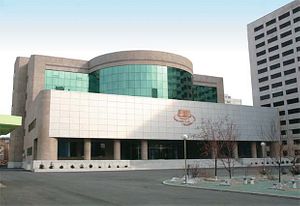Stories about North Korea’s online education first emerged early last year when the country’s propaganda news outlets extensively promoted that form of education.
In a country where educational background is an essential factor in defining one’s social class, it is a sign of change for North Korean society that an increasing number of people are earning degrees and receiving further education online.
Even prestigious Kim Il Sung University, the alma mater of North Korean leader Kim Jong Un and most of his family members, awarded degrees to those who took courses online for the first time in 2018.
After almost a year of hibernation, the online education promotion campaign appears to be coming back.
North Korea’s state-run Rodong Sinmun newspaper said on July 4 that the country should further develop its online education system, for instance.
Rodong Sinmun stressed that the online education system is essential for the country to nurture talents, and provides sufficient educational opportunities for all members of society and guarantees lifelong education.
The paper added that the number of North Koreans seeking to receive remote education continues to rise, with growing demand among scientists, technicians, and educators as well as workers at factories, businesses, and cooperative farms.
To further develop the system, the government should expand the number of departments to study and match the trends of modern educational development, educational needs, and online education trends, Rodong Sinmun noted.
Rodong Sinmun’s report is not empty rhetoric. Another prestigious university in North Korea, Kim Chaek University of Technology, has reportedly developed an intelligent management system for distance-learning programs.
The North’s propaganda outlet Tongil Shinbo reported on July 5 that the system is designed to automatically check the understanding of students who are taking online lectures. It also comes up with necessary learning material for students by analyzing which fields students need additional help in. The system even helps professors at the university operate a real-time question and answer session with students.
Such steps show that North Korea is interested in not only developing and promoting online education in the country but also managing it properly to maximize the benefits.
Another propaganda outlet, DPRK Today, said last year that a growing number of students are viewing university lectures using their mobile phones and tablets. For instance, the number of students studying at the Kim Chaek University of Technology via distance learning courses jumped to about 10,000 across North Korea as of October 2017, up from 40 when the program began. The number should be bigger than that by now.
However, as The Diplomat has pointed out, university education is still considered special and privileged in North Korea. It is easy to assume that those who take online sources or earn degrees via distance learning programs are no different from the people physically attend universities in North Korea — usually those with good family background, connections, and money.
In other words, it is difficult to expect that an online education system will provide greater learning opportunities to a broader range of people in North Korea.
But one thing to note in this regard is that Rodong Sinmun, quoted above, mentioned online courses are getting popular among workers at factories and farms. Although there were no further details, it could be seen as a sign that the scope for online education has become wider. No mention about factory or farm workers taking online courses was observed last year.
Online learning presents an extraordinary opportunity to help address disparities in education access across the world. Some studies have suggested that it could contribute substantially to poverty reduction if its potential is recognized, and signs are evident that North Korea is moving in the right direction.

































